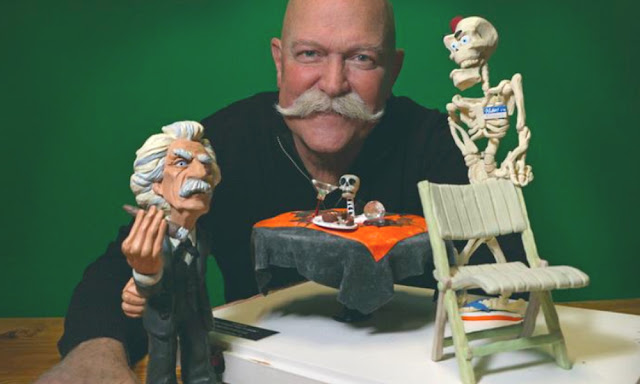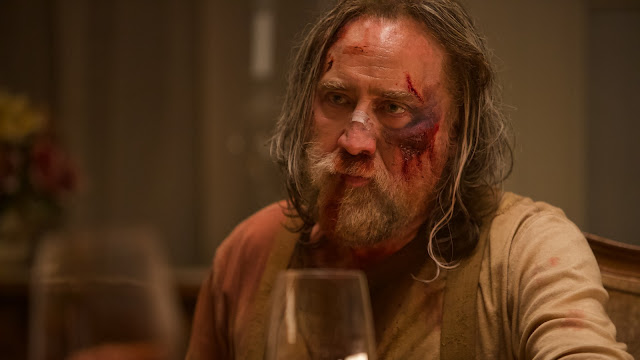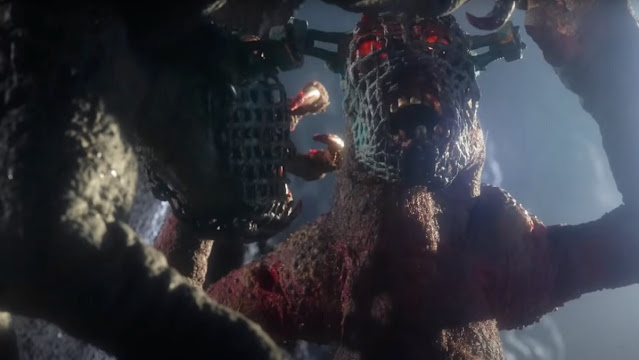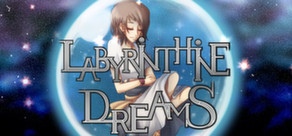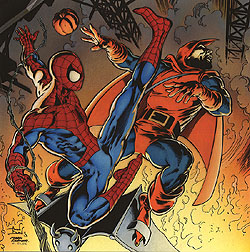A year ago, it wasn't clear exactly how the ongoing plague would effect movies as a whole. At this point, I have a better sense of it. The blow dealt to movie theaters combined with flourishing streaming platforms has exacerbated something that had already began. Movies are experiencing what music did with the advent of file-sharing programs and YouTube - the idea of "mainstream" films that everyone is aware of is becoming very narrow and the audience is being split into different niche groups. The only film I can think of which had that feeling of a "must-see" was Spider-Man: No Way Home, and this probably won't happen again as the studios will inevitably run the "multiverse" concept into the ground.
You have to be loaded in order to access all the different streaming platforms, so movie buffs without unlimited income have no choice but to pick and choose. I've felt myself drifting into my own niche over the past year - I've become more involved with the online horror community, which is nice, but I know that has limited my broader sense of what's going on with movies. It wouldn't take much for this annual list to become completely dominated by horror. Maybe that would be more fun but for now, I'm still trying to cast a wide net.
One note about eligibility for this unusual year - I decided that anything that competed for the Oscars back in April would not be considered for this list, even if the extended awards season meant that some of the nominees technically released in 2021. Other people might do it differently, but the idea didn't sit right with me. If I had, Quo Vadis, Aida would be ranked first on this list. So I highly recommend checking that one out. It will almost certainly be showing up on the Best of the Decade list in 8 years.
10. The Night House
This seemingly traditional ghost story stars Rebecca Hall as Beth, a woman left alone in a lake house after her husband kills himself. While struggling with her emotional distress, she discovers evidence that her husband led a disturbing secret life. The truth about everything turns out to be different from what typically happens in this sort of movie. Hall puts a unique spin on the typical widow role - Beth is heartbroken but also barely holding back seething anger and resentment over the situation she's found herself in. It's gripping and atmospheric filmmaking that also has a heart, thanks to Sarah Goldberg as Beth's incredibly loyal friend.
9. In the Same Breath
I know, I know. Who wants to watch a documentary about COVID-19 when our entire lives are a documentary about COVID-19? I was drawn to this one because of my own interest in how movies, fiction and non-fiction, interpret history and I think that if this miserable plague ever ends, it will be an important document in terms of how it's remembered. It's an unusually personal subject for the director Nanfu Wang, who was born in China but has been living in America for many years. She traces the early days of the virus from its initial detection in the waning days of 2019 at a Chinese “wet market” before it quickly overwhelmed the city of Wuhan. In typical fashion, the Chinese government responded with ruthless censorship and forced patriotism, but none of that kept the virus from spreading all over the world. Meanwhile in the United States, people used their freedom of speech to spread absurd misinformation and protest safety measures, wantonly spreading the disease with little concern for their neighbors. The disillusionment Wang feels at watching both her old and new home fail catastrophically at protecting their people will hit home for just about anyone.
The stylist is Claire (Najarra Townsend), who is very good at her job but struggles with social situations and making friends. The fact that she is a serial killer who drugs and scalps her victims doesn’t help either. When she unexpectedly bonds with the bubbly Olivia (Brea Grant) while doing her hair for a wedding, Claire makes an effort to give up her murderous ways. The depiction of intense social anxiety, that feeling that any minor mistake in interacting with someone will ruin a once in a lifetime chance, is so accurate it hurts. She is a dangerous lunatic, but Townsend is so good that your heart will break for her anyway. The director, who was once a hairstylist herself, has a cameo as a woman in the absolute wrong place at the wrong time.
7. Claydream
A profile of the genius stop-motion animator Will Vinton, the visionary with a distinctive handlebar mustache who first coined the term “claymation.” Vinton started out working in a small house in Oregon, but his steadily growing studio created Oscar-winning short films, the stunning feature film The Adventures of Mark Twain, and several famous commercial mascots like the California Raisins and the talking M&M candies. He was hailed as the next Walt Disney until his career fell apart thanks to his lack of reliable business instincts and a disastrous partnership with Nike. The documentary focuses a lot on the financial side of things, which may disappoint viewers hoping for a more in-depth look at his creations, but there are many clips of his brilliant work that are often smartly matched with the emotional undertones of the current scene. Vinton passed away from myeloma during production on the movie, which brings everything to an unexpectedly bittersweet conclusion.
6. Pig
It's easy to forget in the midst of all the memes and questionable role choices that Nicolas Cage is still a great actor. He had his least showy role in ages as Robin Feld, who was once a renowned chef but has since retreated into the Oregon wilderness to make a meager living foraging for truffles and selling them to a supplier (Alex Wolff). Robin's only friend is his beloved pig and he is forced to re-enter society when the animal is stolen one night. It's the setup for a typical revenge drama, but this movie is actually a pointed deconstruction of those movies, particularly John Wick. Robin has no intention to use violence to get the pig back - instead he relies on his connections in the Portland restaurant scene. While his time in isolation has seemingly robbed him of social graces (if he had them to begin with), it has also left him clear-eyed about how people deny themselves happiness because they think they need to in order to succeed. Defying expectations to the very end, it’s a surprisingly poetic drama about trying to hold on to what gives your life meaning.
5. Procession
Six middle-aged men who were abused by children by Catholic priests are approached by the filmmakers and offered a chance to collaborate on short films about their experiences. It’s similar to the premise of The Act of Killing, although in this case the subjects are far more sympathetic. The scenes they come up approach similar themes in many different ways, offering insights about healing from trauma that aren’t necessarily specific to the abuses of the church. Which approach the viewer finds the most memorable is something of a rorschach test (it will surprise nobody who knows me that my favorite was the scene where a man restages his meeting with a dismissive Catholic oversight committee and gives himself the chance to deliver the profane rant they deserved). It’s often as emotionally brutal as anyone would expect but there are also moments of surprisingly cathartic laughter and moments of personal triumph. Opening up past wounds for the sake of helping future victims is a truly heroic act.
4. Mass
Six years after a school shooting, four parents gather in a church to discuss the impact it has had on their lives. You could hardly blame any viewer for not wanting to engage with this subject matter, but nobody who decides to watch it will forget its emotional impact. Jason Isaacs and Martha Plimpton play the parents of a teenage boy who was shot, while Ann Dowd and Reed Birney play the parents of the teenage boy who did the shooting. The acting from all four leads is truly awe-inspiring as the pained politeness gradually gives way to the deep hurt and frustration underneath. For anyone curious, the madness of American gun culture is discussed but only briefly. It focuses on what’s missing from most of the angry debates and commentary about the endless cycle of violence - a reckoning with the awful pain of people who have encountered it firsthand, the people who can’t go back to their regular lives when a two hour movie ends.
3. Mad God
Going back to the stop-motion animation, here is a very different approach to the style. The special effects maestro and animator Phil Tippett is best known for his work on other people's movies, particularly the original Star Wars trilogy. However, he also spent 30 years working sporadically on this engrossing stop-motion film, one that may be just too ghastly and uncompromising for anyone not deeply invested in animation as a medium. A man in a gas mask descends into a vast industrial hellscape, encountering all manner of grotesque creatures as he carries out his ambiguous mission. There is no dialogue and not much of a plot, either - the whole thing operates with the bizarre logic of a nightmare. The production design and character movements are peerless. In a few scenes, real-life actors are worked into the setting but you’ll find yourself questioning whether this is just more top-notch animation. The various depictions of cruelty and squalor on display might make a viewer concerned for Tippett’s state of mind, but nobody will be able to deny his mastery of this art form.
2. Censor
A fascinating, ambitious movie that takes place during the United Kingdom’s “video nasties” panic of the 1980s, when dozens of crudely violent slashers and Italian cannibal films snuck past oversight boards thanks to new and unregulated VHS technology. I've been fascinated by this era for a long time and it was really exciting to see a movie engage with it so deeply. Enid (Niamh Algar) is one of these censors, dutifully removing the most objectionable bits from movies with titles like "Rat Brothel" and "Cannibal Carnage." She’s able to brush most of these movies off until she watches one that reminds her of the disappearance of her younger sister, an event she was present for but has no memory of. In the meantime, her parents have "censored" it for her sake, ignoring her pleas for more details and getting angry with her for trying to figure things out herself.
The storyline begins to unravel along with Enid’s mind and the movie makes a compelling case that censorship, whether performed by an office worker, your parents, or even your own mind, is ultimately harmful because it allows people to react to the upsetting parts of life by investing in a reality that simply doesn’t exist and leaves them unable to cope with the awful truth when it can no longer be ignored. The idea is more politically relevant than the creators likely could have imagined in a year when the public's refusal to accept the reality of everything from an election to the true dangers of a killer plague (and the media figures who capitalize on their troubled feelings by feeding them the false information they crave) led to devastating consequences.
1. Beyond the Infinite Two Minutes
An ingenious low-budget Japanese film that makes the most of its wacky premise while also shooting the entire story in what appears to be a single take. Kato (Kazunari Tosa) is a café owner who discovers that the closed circuit camera feed connected to his computer is actually some sort of two-way time mirror with a two-minute delay. In other words - if you are watching the café from his upstairs apartment, you are looking two minutes into the future. If you are watching the apartment from the café, you are looking two minutes into the past. It’s mind-blowing stuff, but the cast gets the gist of it quickly and soon Kato’s employees and friends are doing all sorts of humorous tricks. Naturally, they get a bit too cavalier with time and space and end up getting into trouble. The enthusiasm of the cast is infectious and what makes the movie really special is that it has a lovely warmth to go along with its intelligence. It does more with its tiny budget than blockbusters that spend obscene amounts of money but I don't think that was what moved me to put it at number 1. For its very brief running time (70 minutes, so efficient!), this movie made me feel like everything was okay. In this joyless, hopeless world, that is truly remarkable.
11. Last Night in Soho
12. Worth
13. Belfast
14. Zola
15. Bad Trip
16. The Girl Who Got Away
17. The Green Knight
18. Come True
19. Masking Threshold
20. The Found Footage Phenomenon
In my highly unscientific evaluation, 2021 sucked about 5 percent less than 2020. Let's keep up that progress, everyone!



